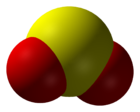Let’s Talk About Sulfites
Countless wine drinkers blame sulfites for headaches or allergic symptoms after consuming wine. What are sulfites, anyway? Chemically, sulfite is sulphur dioxide (SO2), an antimicrobial and antioxidant compound that occurs naturally and is also added to numerous foods and wines to retard spoilage. Examples of foods containing sulfites include dried fruit, some canned fruits and vegetables, condiments and many others. The percentage of the population that is truly allergic to sulfites varies, but it may be as little as one percent. People with severe asthma are those most likely to be affected and symptoms can include hives, trouble breathing, trouble swallowing, and other serious reactions.
The uproar over sulfites began in the 1980’s when salad bars were in vogue. The cut vegetables and fruits on these bars were liberally sprayed with sulfites, up to 2,000 parts per million, to retard spoilage. The FDA began receiving complaints from consumers experiencing adverse reactions and soon after, strict regulations were put in place. In 1986, the addition of sulfites to all fresh fruits and vegetables that are eaten raw was banned and in 1988, it was federally mandated that wine labels contain the warning “Contains Sulfites”. In reality, wines have always contained some sulfites as they occur naturally during fermentation. The upper limit for wine is 350 parts per million and most wines produced by quality wine makers contain only 100 parts per million or less. As I wrote in the February 2016 post about organic and sustainable viticulture, Jerry Sass strives for 25 parts per million, or less.
Sulfites are necessary in wine making. They serve to arrest fermentation at the desired time and they also prevent oxidation and the  resulting discoloration and eventual spoilage of the wine. Sulfites serve to protect the wine from bacteria; without sulfites, the grape juice would turn to vinegar. The tannins found in red wine act as natural antioxidants and therefore, sulfite levels tend to be lower in red wines than white wines.
resulting discoloration and eventual spoilage of the wine. Sulfites serve to protect the wine from bacteria; without sulfites, the grape juice would turn to vinegar. The tannins found in red wine act as natural antioxidants and therefore, sulfite levels tend to be lower in red wines than white wines.
The headaches sometimes attributed to wine are much more likely caused by consuming too much alcohol and not enough water than by sulfites. For numerous reasons, it is truly important to hydrate when consuming wine, or any alcohol, to prevent the imbalance of alcohol to water that can result in not feeling well.
Cheers – drink good wine and remember to hydrate!



 Lisa Gorham
Lisa Gorham